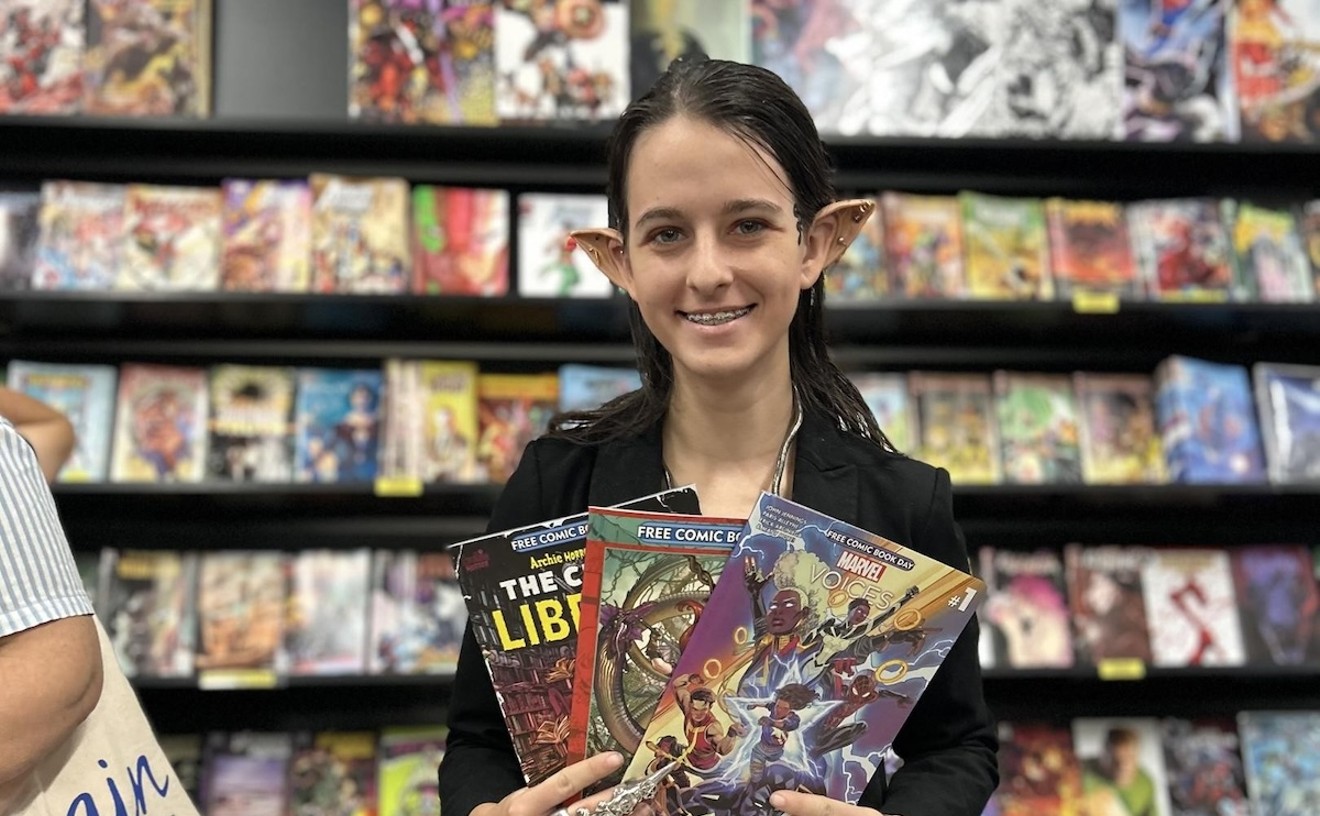There's nothing worse than having a holiday dinner -- or a funeral, or a wedding -- to force you to spend an extended and unnecessary amount of time with your family. Unless you happen to be forced to do that by a hurricane, which, in turn, forces you to confront some ugly truths about your peeps. Such is the plight that befalls three siblings and their parents in Captiva, 2011 Carbonell Award winning playwright (Best New Work) Christopher Demos-Brown's latest work that opens Thursday at the Arsht Center.
We spoke to Demos-Brown about the process of writing, creating characters, and dealing with the inevitable creeping fear that every writer faces: the feeling that your work is turning out to be a piece of shit.
New Times: Where do you find yourself writing mostly?
Christopher Demos-Brown: I write most of the time at home. But I do quite a bit of writing when I'm traveling on a laptop, or at a bar, restaurant or coffee shop. I try to always carry a journal of some kind with me as often as possible.
Are the journals mostly in case a real-life person or situation arises that you'd want to add into a story?
I have little journals filled up with notes that'll probably never see the light of day, and every now and then I'll jot something down that makes it into a play.
What is your writing process? How do you go from the seed of an idea to a story?
That's a good question because in talking with other playwrights, that's probably one of the things that we talk about the most. The writing process, and how do we develop ideas? And I find that, while the process changes a little bit for each play, there are certain things for every project that I'll stick with. I generally tend to write about things that irritate me, or make me angry, or bother me a lot. That's the sort of emotional impetus. Then what I find is that usually there'll be a character or situation, or a specific problem around the character or situation.
What I'll try to do is not impede the process of letting my mind run wild with it. I'll find myself backed up into too many corners if I don't start making some clear choices on the story because the first part of it is art, the second part of it is craft. And there comes a point where I say, okay, now that I have a sense of who these people are, hopefully where they're going to be or what their story is going to be about, it then becomes how do I hammer this into a story that makes some sense.
Does that process work when creating characters?
Sometimes it's the opposite. I know with my play Our Lady of Allapattah, it was really based on an idea where I had two kinds of characters in mind and allowed them to riff a little bit on the idea. With When The Sun Shone Brighter, that was really based more around a particular character in a particular city and I had a pretty good idea what I wanted this character to be and what his problems were going to be. So it really depends. My process with projects starts with the "falling-in-love process" -- which has to be pretty strong because it's going to have to sustain you for a while. Then there's the "this is such a piece of shit and I can't believe I'm still writing it" process. And then there's the "just finish it process" because I think the worst mistake you can make is not finishing. The love process has to get you through the tougher stages you go through as a writer, especially the "this is such an unbearable piece of shit" stage, for lack of a more elegant way of putting it.
With all that in mind, how rewarding is it to see these characters and stories you've wrested with finally come to life on stage with actors, in front of an audience?
That's what it's all about. It's really wonderful. What's especially wonderful about it is where, in rehearsals, the characters start to reveal more to themselves than what I had seen in my own head while writing them, because actors will find things about these characters that makes them much more real and interesting than one person sitting there writing about them on a computer.
You mentioned earlier how you generally write about things that irritate you. How much of the characters in Captiva are based on people or relatives you know?
The basic outline of these characters are not dissimilar from my own family. But most of the expository elements of the characters have nothing to do with anybody I know. However, I always wanted to write a play about the typical modern American family, that I just don't see too much being written about. And so the way these characters interact -- their sort of fundamental behavior -- are very similar to people I know and to my own siblings in particular. But the specifics of their situation are completely fabricated. In other words, their sarcasm, the fact that the siblings in this story do not allow one another to get away with anything because there's not a lot of sentimentality between them. They're built around a kind of "you're not going to get away with the crap that your friends put up with when you're around me" attitude. That kind of thing is very much like my siblings and I but, other than that, they're pretty much invented.
So would you say Captiva is a dark comedy then?
What I told the actors on the first day of table readings and rehearsals was that it's a comedy, but think of it as a drama that happens to be funny rather than a comedy. So the humor really comes out of the situations and the way these people are and the way they revolve around each other. It's a dark comedy but with, as I said, drama that happens to be funny.
Christopher Demos-Brown's Captiva opens this Thursday at the Arhst Center Carnival Studio Theatre (1300 Biscayne Blvd.) Showtime is at 7:30 p.m. Tickets start at $40. Call 305-949-6722 or visit arshtcenter.org
Follow Cultist on Facebook and Twitter @CultistMiami.











